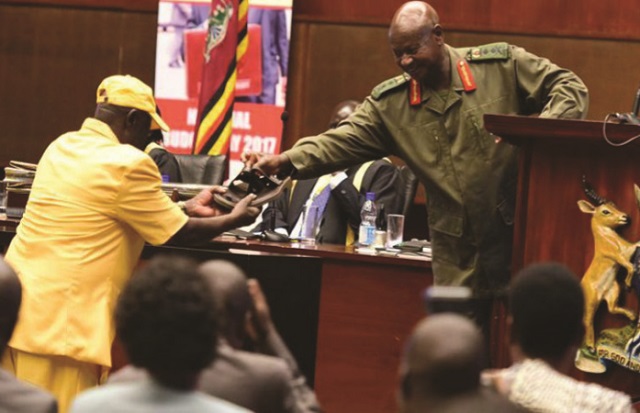
Why the elders eye on history shows this could plunge country back into its dark past
Kampala, Uganda | FLAVIA NASSAKA | Zachary Olum watched the proceedings of the Sept.21 plenary on his couch in his living room at his quiet spacious home in Naguru, a high-end Kampala suburb. Thanks to the live televised coverage of most local TV stations, he watched most of the events; from the scuffle between security operatives and members of the opposition to press conferences by different groups. It was as tense as Olum would have expected it to be over the motion to amend article 102 (b) of the constitution to lift the presidential age limit from the current 75 years.
Olum, a Democratic Party historical and former member of the National Resistance Council, says the deployment around parliament took him back to the days when he had just got his first job in civil service as an agriculture officer. The deployment at the time was similar and the reason was almost the same.
It was 1966 and then Prime Minister Milton Obote wanted to consolidate himself in power after storming the palace and driving out the Kabaka who was president.
“There was a lot of anxiety. Already Obote had fallen out with Buganda that had earlier given all their 21 seats to UPC. That day when the constitution was to be amended Idi Amin the commander with his army surrounded parliament and the majority UPC passed the 1966 constitution”, Olum recalls.
He says that the “pigeonhole constitution’ was then distributed to MPs and debate started very fast even as four members – Boniface Byanyima, Alexander Latim , Obonyo and Martin Okello stood and spoke against it – warning that it was undemocratic. Nobody listened. They were determined to change.
Now, Kassanda South Legislator Simeo Nsubuga can be put in the same league as the legislators of the 60s by Olum. On Sept.21 he was at parliament by 8am in preparation for plenary scheduled for five hours later. With his signature yellow tie, Nsubuga who has been accused of benching for a ministerial position banked on the fact that he was not breaking any law in supporting lifting the age limit. “The question should be whether we are mandated to do so,” he told journalists and assured them that 300 MPs had signed in support of introducing the private members’ bill.
Deputy Attorney General Mwesigwa Rukutana was also in support. The reason he told The Independent is that at the time when they were coming up with the constitution people thought at the age of 75, a person is frail and no longer has the vigor to lead a nation, a thing he opposed in 1994 in the Constituent Assembly. He says he knew there are exceptions of people below 30 and are politically mature whereas others are above 75 and are still as vibrant as they were while still younger. For him, if people have a good leader, they shouldn’t be kicked out merely because of age.
But opposition to lifting the age-limit is equally determined. They include some MPs in the ruling NRM. Legislators like Alex Ruhunda are warning President Museveni to resist the temptation of listening to short term opportunistic individuals that are pushing for removal of age limit. He says by leaving the constitution intact, the party would have a chance to plan for succession and that the legacy of Museveni will remain intact like that of Tanzania’s Mwalimu Julius Nyerere who built strong systems that have made political transitions in the country less chaotic.
“I pray that we stop being overzealous to make a fundamental mistake that will create a huge political and security problem for our country,” Ruhunda says.
When The Independent spoke to him on Sept.23, Olum who was in parliament for 20 years – 1986 to 2006 was already convinced that parliament would pass the Bill allowing President Museveni to extend his rule. The Igara West legislator Raphael Magyezi had not even yet been allowed to take leave from parliament to prepare the Bill. So how could Olum be so sure?
“I know Museveni. He will not say a thing but money will exchange hands. He will keep quiet and push through his hangers on,” he said. He added that Museveni’s biggest challenge now are his ‘hangers on’ who wouldn’t dare raise a finger against him even when they see him straying because they are benefitting.”
Olum speaks of how politicians use such happenings to push their own selfish agendas under the guise of working for a good cause.
 The Independent Uganda: You get the Truth we Pay the Price
The Independent Uganda: You get the Truth we Pay the Price


